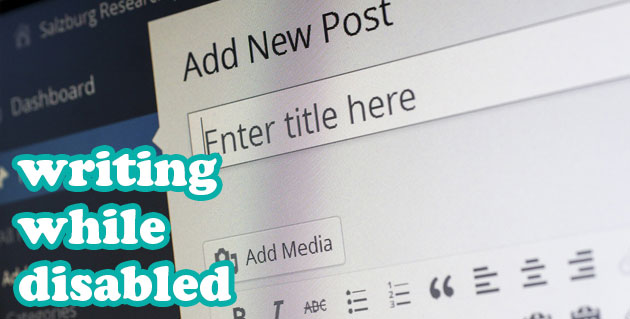by Erin Hawley
“Are people telling me this thing I wrote is good because it’s actually good, or are they praising it because they have such low expectations of me?”
Being a writer is hard. I’m a perfectionist, which makes me dislike everything I produce. I don’t necessarily think that’s a bad thing, as my perfectionism makes me a decent writer and an even better editor.
But as a disabled writer, I question other people’s reactions to my work. The opening quote is something I ask myself every time I share my writing with others.
Some people name that thought process “imposter syndrome,” but that doesn’t cover it. My insecurities around people’s reactions stem from ableism, specifically the way abled folks assume so little of me. It stems from inspiration porn, where every action of a disabled person is praised, including mundane, ordinary things like going food shopping or having friends. I grew up defying expectations from an ableist society by simply existing. Anything beyond that, like graduating from college or being in a romantic relationship, blows people’s minds – and it shouldn’t.
While much of my work is aimed at dismantling ableism, I understand this -ism, like all oppression, is far too ingrained in society to change overnight, or within my lifetime. That means I must learn to live within this structure. I value my writing – I need to make that clear. This isn’t about my talents, but more about how abled and some disabled people view my talent, and how those views negatively impact my craft. I would write more if I felt secure that my work was valued and critiqued by others the same way I view and critique myself. I wouldn’t hesitate to publish if I knew my writing was not seen as a miracle, an anomaly, or met with a patronizing “good for you!”
So when I release a blog post into the wild and receive praise for it, I can’t tell if it’s genuine. And I’m certain some of it isn’t genuine, but rather a manifestation of ableism – even if well-meaning and unrealized. I want abled people to read my work knowing I am a disabled woman because I am proud of who I am, but I also want them to read it without the framework of ableism. That isn’t possible, though, so I internalize and dissect my writing to an unhealthy degree. I can’t accept praise even if I also think my blog post or poem or marketing pitch for work is good.
I’ve thought about ways to dismantle this thought process. What I’m trying to do is write for a small audience. I don’t mean the number of people who read my posts; what I mean is, when I write, I only have myself in mind. Or I only have other disabled people in mind if I’m writing specifically about disability. I am telling myself that abled people’s opinions of my writing do not affect or control my writing. Some people will always view everything I do through the lens of ableism, and I can’t let that hinder my words. Disassociating is not an easy process, but I think it’s a necessary one to keep my powerful voice intact.
I am curious if other disabled writers experience similar thoughts, or have any tips on how to keep writing while disabled. Please let me know in the comments!


(Cross posted) Just read you’re latest post. As a disabled guy, who has strung together a few sentences in my day, I really get what you are saying, still you are too hard on yourself. Just let it come, if it’s good, and honest, you’ll know.
This is one of the more subtle but still heart breaking aspects of structural oppression, it stifles the ability of the oppressed to speak their narratives. While this takes form in a number of ways, the way that it does so through sheer infantilization and making ordinary things into miracles for disabled people is especially insidious.
I think that’s why a lot of times I do not disclose I’m disabled in general when I’m writing. On my own gaming blog, that’s not possible because its part of my brand. But when I’m actually working on my novel or just have something random to say, my non-disclosure is almost a screen I hide behind because I want my work judged on its own merits and not because the crippled girl wrote a thing. And as I’m writing that it almost sounds like I’m ashamed of my disability. You see the conundrum. I’m not ashamed of my disability but I don’t want it to define every aspect of me as a person. So what I’m basically saying in a very long, drawn out nutshell is, I hear you, girl.
I honestly think you’re a great writer by any standards. Even though many would consider me to be more “high functioning” than you (which I know is problematic in and of itself), you’re someone I look up to and admire because of how intellectual, articulate, passionate, and motivated you are.
I think you’re a wonderful writer. Period. Not “a wonderful writer (considering she has a disability, and making allowances for that)”…..just a wonderful writer, among the universal group of “all writers”. I am not (now) in need of accessible options, but I follow your blog because I am interested in accessibility issues—and who knows but that one day I WILL need adaptive technology. You go, gal!
Thank you!
I think what matters is when people come back to continue to read your writing. In the first pass they can say whatever, for any reason. But if it wasn’t good, they won’t come back. If they sign up to your mailing list, keep reading and commenting, it is for your writing. I am a disabled blogger myself, and I think I find both approaches.
That’s a really good way of looking at it. Thank you!